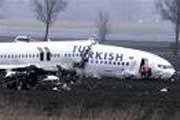 When a Turkish Airlines 737-800 crashed short of the runway in Amsterdam last week, killing nine people, it was one of those relatively rare accidents where no apparent cause was readily discernible. But on Wednesday, Dutch Safety Board investigators said a faulty radio altimeter fed misinformation to the autopilot. The altimeter registered that the airplane was approaching ground level when in fact it was still at 1,950 feet. The autopilot initiated a power-down of the engines in preparation for landing and the airplane slowed to near stall speed. The pilots responded to the situation too late, and the airplane hit the ground. The 737 data recorder showed that problems with the altimeter had occurred twice before, investigators said.
When a Turkish Airlines 737-800 crashed short of the runway in Amsterdam last week, killing nine people, it was one of those relatively rare accidents where no apparent cause was readily discernible. But on Wednesday, Dutch Safety Board investigators said a faulty radio altimeter fed misinformation to the autopilot. The altimeter registered that the airplane was approaching ground level when in fact it was still at 1,950 feet. The autopilot initiated a power-down of the engines in preparation for landing and the airplane slowed to near stall speed. The pilots responded to the situation too late, and the airplane hit the ground. The 737 data recorder showed that problems with the altimeter had occurred twice before, investigators said.
Boeing has issued a statement to 737 operators reminding pilots to carefully monitor instruments during critical phases of flight. The Dutch Safety Board said in its report that it is “of the opinion that extra attention is needed for the role of the radio altimeter when using the automatic pilot and the automatic throttle system.” The board asked Boeing to pay extra attention to a part of a manual for the Boeing 737 in which is stated that in case of malfunction of the radio altimeter(s), the automatic pilot and throttle system that are connected to it may not be used for approach and landing. The board would like Boeing to consider an investigation into whether this procedure is also applicable during other phases of flight.


































